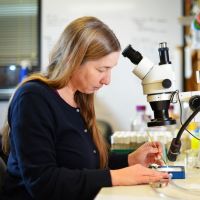About the Project
The Knockout Mouse Phenotyping Program (KOMP2) sites at Baylor College of Medicine, Jackson Laboratory, and University of California, Davis, are collaborating with the International Mouse Phenotyping Consortium (IMPC) to knockout and characterize all protein-coding genes in the mouse genome. Knocking out the activity of a gene provides valuable clues about what that gene normally does. However, creating and characterizing mice with gene knockouts is a time-consuming and difficult process, and is often done by individual research labs with varied approaches. Since the founding of the program, KOMP2 scientists have adhered to uniform phenotyping protocols, data collection, and reporting standards, made all data available via on IMPC website, and deposited all knockout mouse models into repositories for distribution to the scientific community. The current 5-year funding period of KOMP2 is creating and characterizing knockout mice for 1,227 genes.
KOMP2 awardees, in conjunction with the IMPC, have published many peer-reviewed publications, including papers systematically describing genes with previously unknown function in bone, eye, embryonic development, metabolism, pain perception, and human disease. Overall, this effort helps scientists explain the genetic basis of many different types of diseases in mice that also occur in humans, including rare diseases that have been under-studied as well as some common chronic diseases that affect much of the human population.
All mouse model production and phenotyping data generated by the BCM KOMP2 are available through the IMPC website. Mouse models produced by BCM are made available through the Mutant Mouse Resource and Research Centers (MMRRC).
Principal Investigators
Program Manager
Members
News
Baylor receives $12 million grant for third phase of Knockout Mouse Phenotyping Program.


















